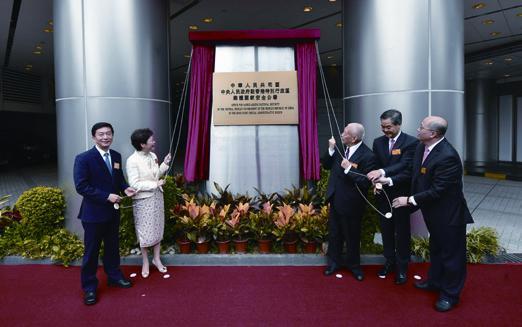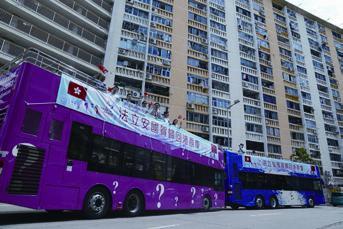Law and Order
By Lan Xinzhen

T he national security law for Hong Kong unanimously passed by the Standing Committee of the National Peoples Congress (NPC), Chinas top legislature, has attracted widespread attention. Effective immediately, it is officially known as the Law of the Peoples Republic of China on Safeguarding National Security in Hong Kong Special Administrative Region (HKSAR).
July 1 marked the 23rd anniversary of Hong Kongs return to the motherland, and the adoption of this new law just hours before the anniversary is the best birthday gift that will help lift Hong Kong out of the turmoil of the past year. On the day the law was passed, the“pro-independence” Hong Kong National Front announced that it would disband its branch in Hong Kong. Key members such as Joshua
Wang, Nathan Law and Agnes Chow pulled out of another political group advocating “Hong Kong independence,” demonstrating that the law is proving an effective deterrent.
Extensive support
Anti-China forces abroad, working alongside“pro-independence” forces in Hong Kong, have been promoting riots that have seriously jeopardized Chinas sovereign security. The HKSAR Government has been unable to enact laws on its own to safeguard national security in accordance with Article 23 of the Basic Law of HKSAR because of obstruction by the opposition. As national security is part of its mandate, the Central Government has created systematic and comprehensive regulations for the legal system and enforcement mechanisms for safeguarding national security in HKSAR.
These regulations are necessary for the implementation of the “one country, two systems” principle, and to prevent, suppress and impose punishment for the offenses of secession, subversion, organization and perpetration of terrorist activities, and collusion with a foreign country or with external elements to endanger national security in relation to HKSAR.
On May 28, the Third Session of the 13th NPC approved the Decision of the NPC on Establishing and Improving the Legal System and Enforcement Mechanisms for Safeguarding National Security in HKSAR, which marked the start of the legislative process.
The drafting of the law is based on extensive research, including suggestions put forward by Carrie Lam, Chief Executive of HKSAR, and other major officials from the HKSAR Government. The Hong Kong and Macao Affairs Office of the State Council and the Liaison Offi ce of the Central Peoples Government in HKSAR listened to national legislators and political advisors from Hong Kong as well as representatives from various sectors in Hong Kong. The draft text went through a number of modifi cations so that the law best reflects specific local conditions and represents local residents opinions.
A targeted law
Secession, subversion, organization and perpetration of terrorist activities are the offenses listed in the law, alongside collusion with a foreign country or with external elements to endanger national security.
Making these four acts offenses targets a very small number of people, mainly those colluding with external forces to promote riots and violence that have undermined national security and stability since Hong Kongs return. The law is by no means designed to curb Hong Kong residents freedoms as some have assumed.
The law stipulates that human rights shall be respected and protected in safeguarding national security in HKSAR. The rights and freedoms, including the freedoms of speech, of the press, of publication, of association, of assembly, of procession and of demonstration, which the residents of Hong Kong enjoy under the Basic Law and the provisions of the International Covenant on Civil and Political Rights and the International Covenant on Economic, Social and Cultural Rights as applied to Hong Kong, shall be protected.

The national security law helps shield Hong Kong from turmoil, maintain its stability and prosperity, and safeguard its democracy, freedom, diversity and openness. The goal is to ensure Hong Kong residents safety and protect them from being intimidated or assaulted by rioters, and also to ensure the safety of international capital and personnel in Hong Kong.
The law is not retroactive. Thus, Hong Kong residents who endangered national security by committing acts now deemed offenses, such as participating in “pro-independence” protests before the laws entry into force, will not be held accountable as long as they cease committing acts against national security. Those who continue to commit such acts after the law entered into force will be punished according to the law, with the severest punishment being life imprisonment.
The introduction of the law has been hailed by the vast majority of local residents as a positive step, while only a small number of “independence” supporters feel worried. These different responses are already telling something.
High degree of autonomy intact
The law stipulates the way in which the legal system and enforcement mechanisms operate at both national and regional levels. There are two major institutions responsible for implementing the laws: the Office for Safeguarding National Security of the Central Peoples Government in HKSAR, and the Committee for Safeguarding National Security of HKSAR. Some claim this structure will undermine the high degree of autonomy enjoyed by HKSAR. However, the law will not hurt the regions high degree of autonomy as the arrangement is made based on full consideration of the complicated security situation in Hong Kong.

